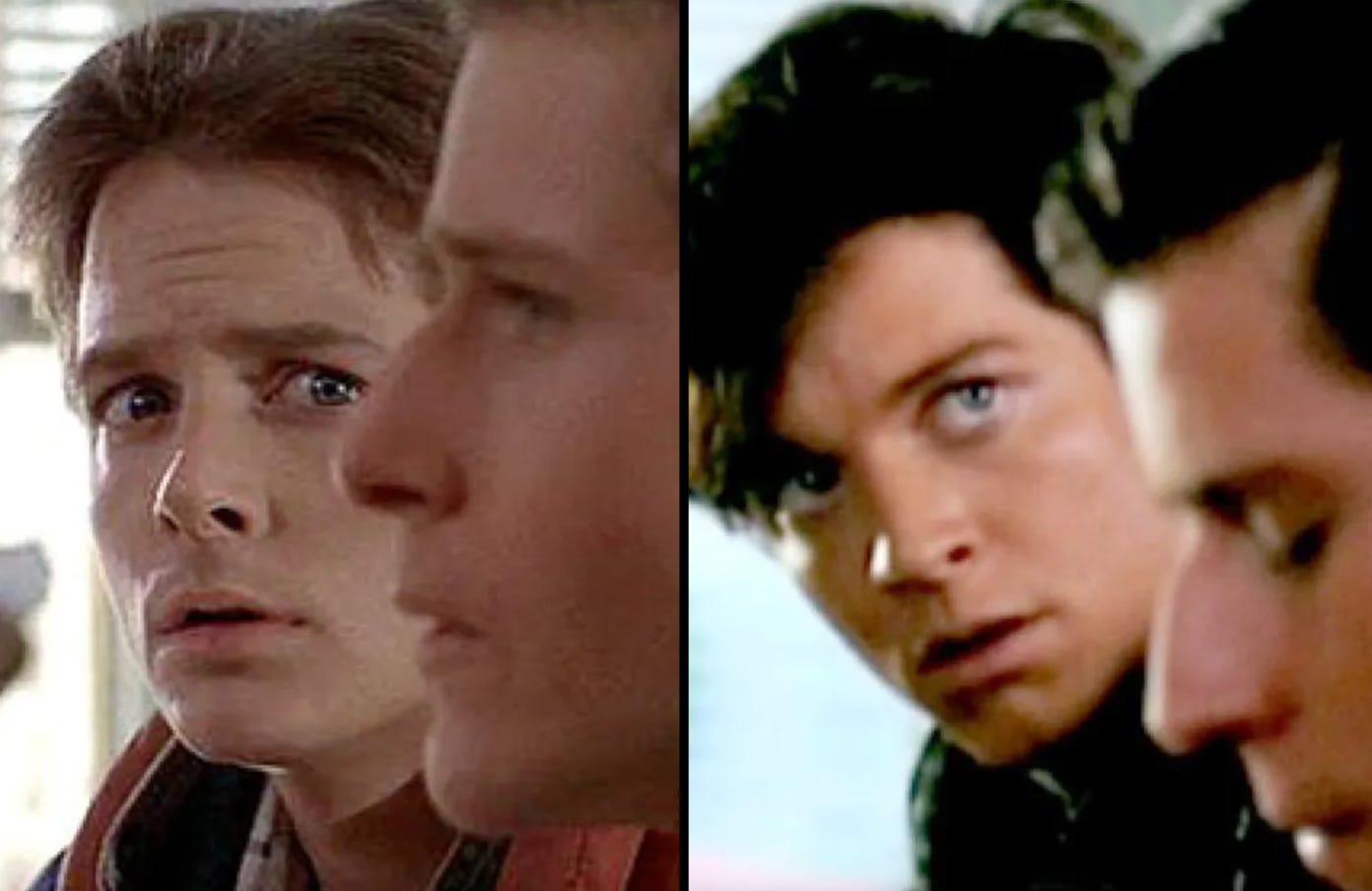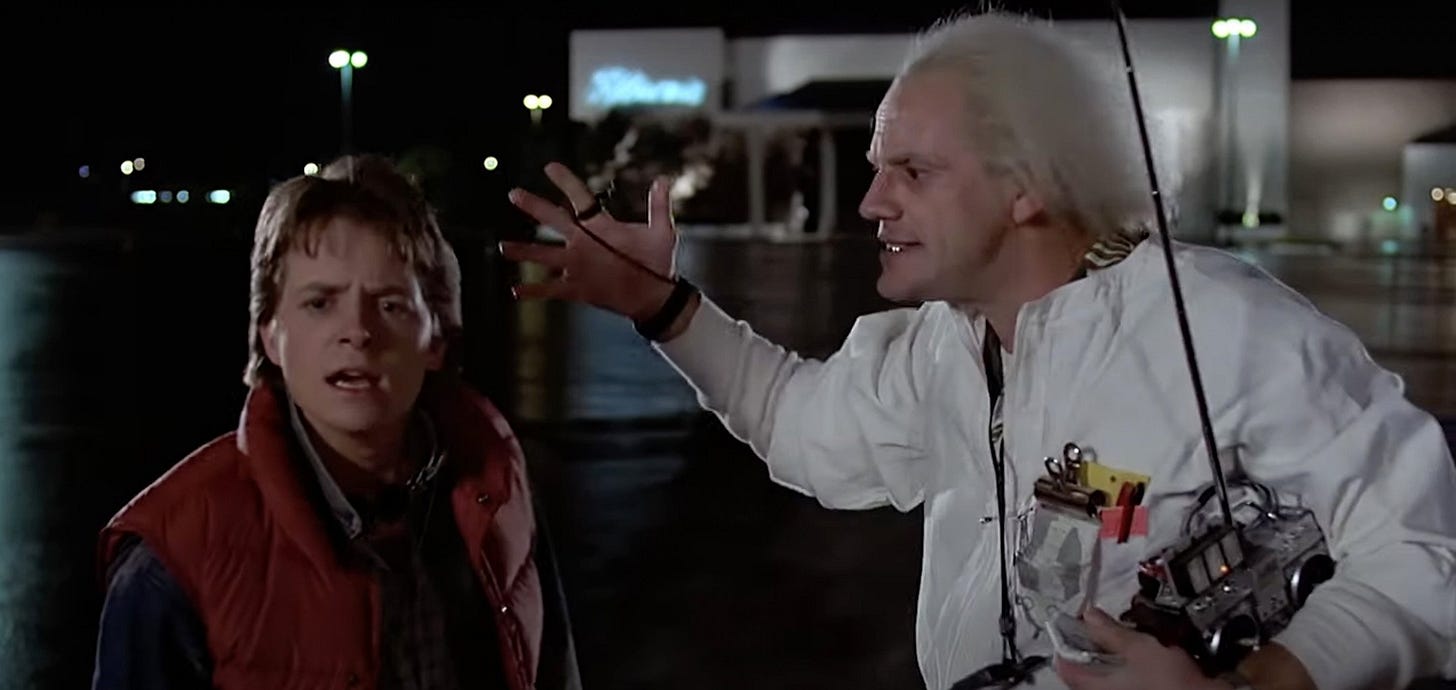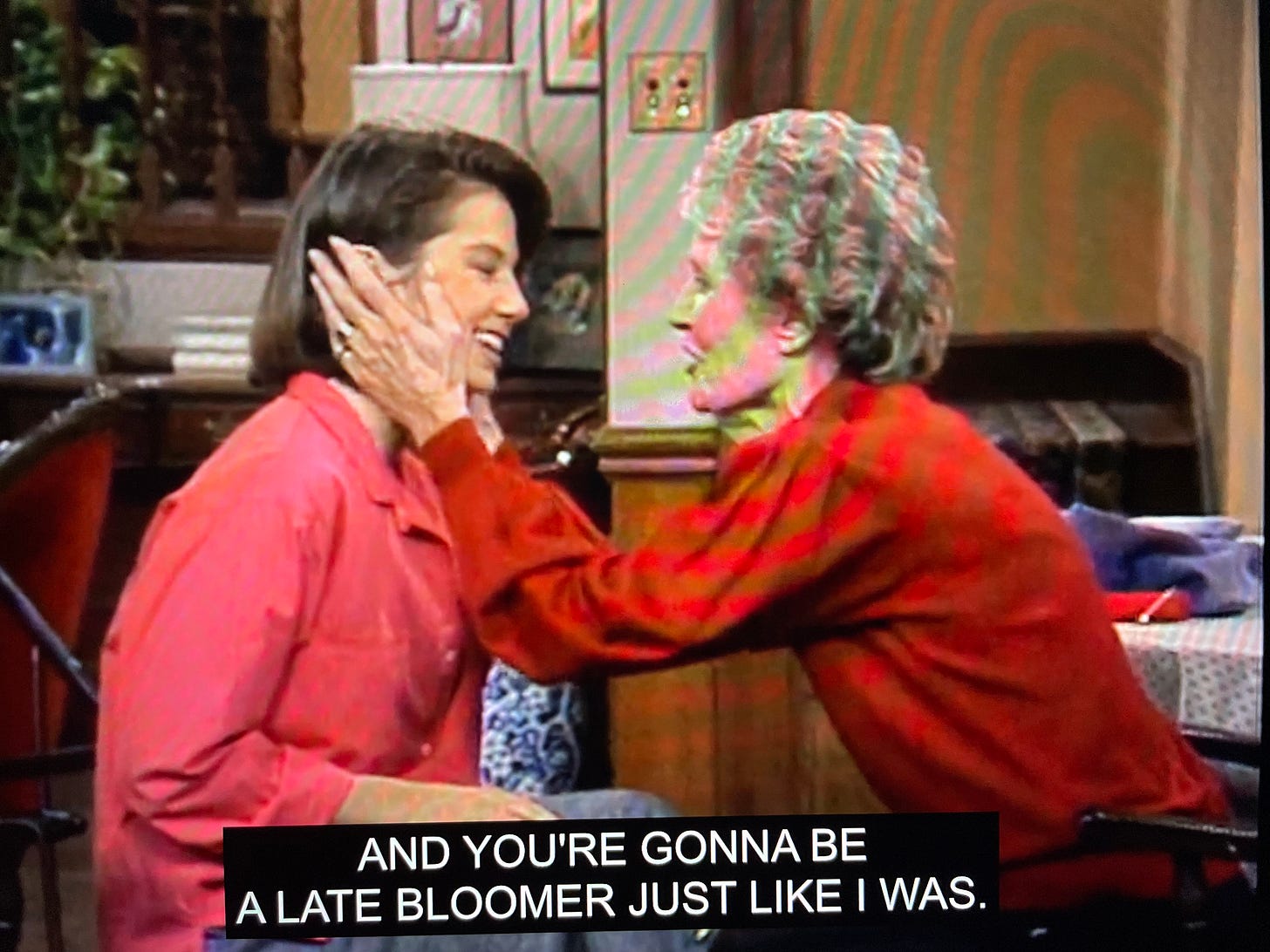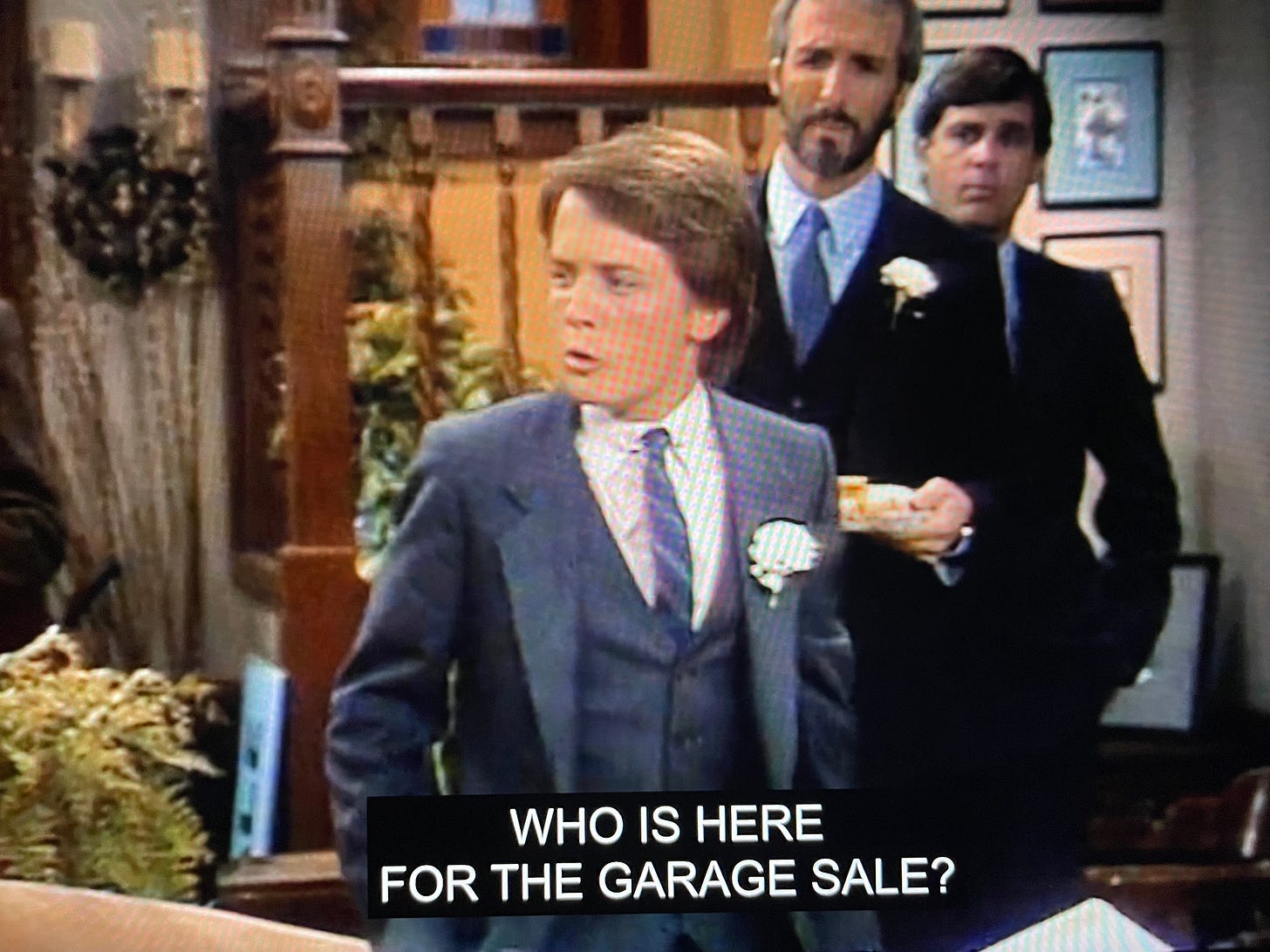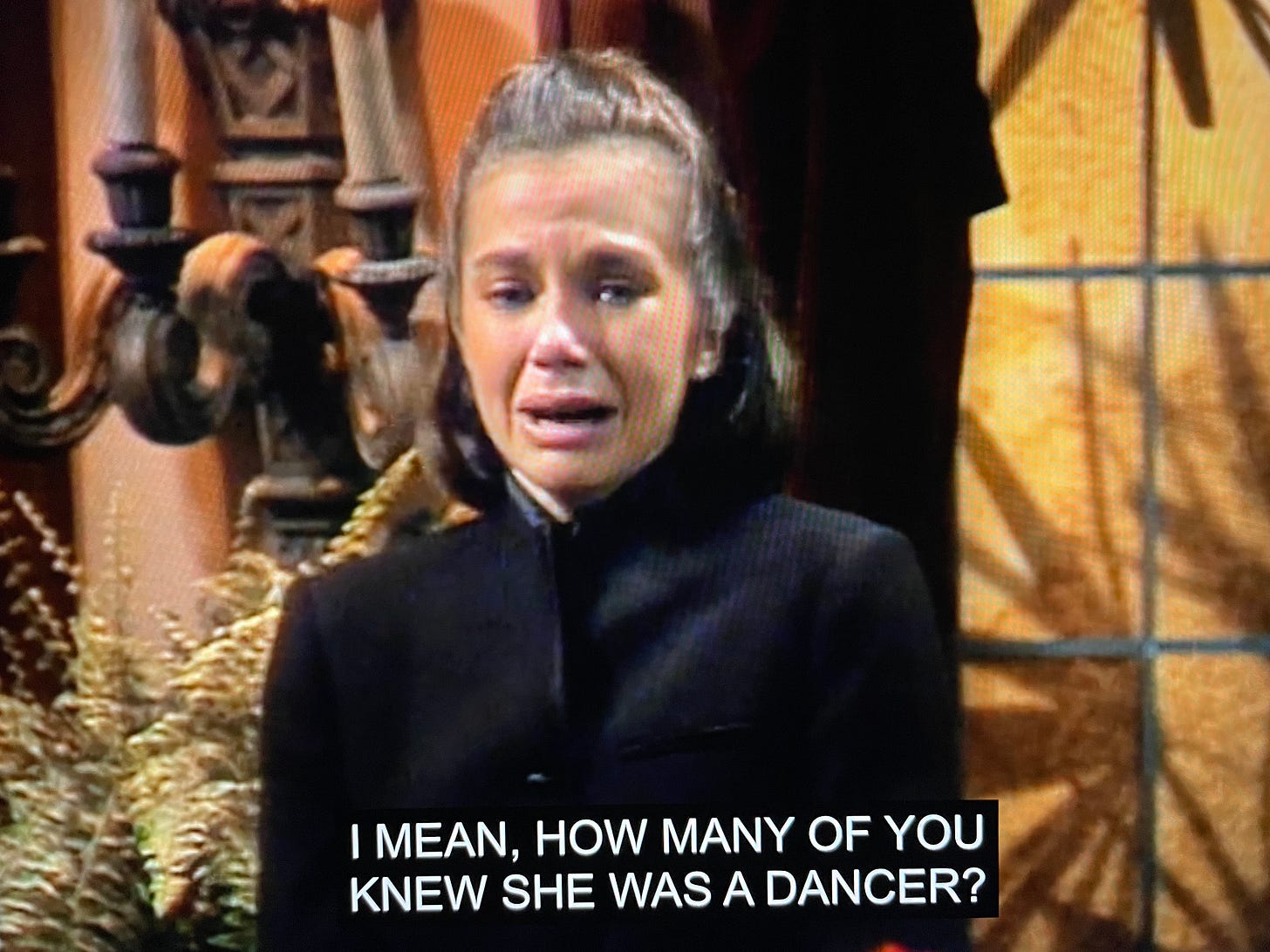...out of a DeLorean?
January 10, 1985: The biggest movie of 1985 gets a do-over, Marty McFly gets shorter, Michael J. Fox stops sleeping, and we mourn an aunt we never knew
This was a HUGE week for Michael J. Fox. His career-launching week. Family Ties creator and showrunner, Gary David Goldberg, called Fox into his office on January 3, the day the Lamaze class episode aired (Ep. 14)
See, there’s this movie. I haven’t told you about it yet, Michael, because you’re too important to my TV show. But I just got a call from Steven Spielberg, and he’s begging. And I said OK.
It’s called Back to the Future.
The producers of BTTF had wanted Fox a long time ago - he was their first choice to play the lead role. But Goldberg said no from the start. FT was climbing the charts, up to third in the Nielsen ratings after it landed the Thursday night slot following The Cosby Show. Goldberg wouldn’t let Fox audition.

So the filmmakers, Bob Zemeckis and Bob Gale, looked around - a LOT - for who could play Marty: Depp, Cusack, Sheen, Macchio, Cryer, Stiller, Modine, Downey, Zane, and C. Thomas Howell were among the serious candidates that auditioned.
Universal Studios owned the movie. Its head, Sid Sheinberg, had seen Eric Stoltz in early cuts of a movie called Mask (NOT “The Mask”!) Stoltz played Rocky, a kid with a facial deformity. Sheinberg insisted that Zemeckis and Gale hire Stoltz.
They started shooting in November of 1984, with Stoltz as McFly. After four weeks of shooting, Zemeckis, the director, showed up at an editor’s meeting on a Sunday, the day before New Years Eve. It was unusual for him to look over the editor’s shoulders, but he just needed to scratch an itch, a bad feeling that he would need to reshoot some scenes.
After 40 minutes of footage, he felt even worse. This wasn’t working. “There’s a hole in the middle of our screen,” he said, “the lead actor doesn’t work.”
He called the head writer, Bob Gale, and then Steven Spielberg, their mentor.
"It was this horrible decision—horrible. It was heartbreaking. We were dailies away from completion. We were shooting at night. And we had to make a decision. I’m sure there are people who will tell you that they’ve been replaced many times, but it wasn’t because of a lack of talent. It was because of a tremendous lack of comedy." - Bob Zemeckis
Stoltz was a method actor, and apparently he went a little TOO deep with his serious take on the story. He surprised the other actors at a table read when he described the movie as a “tragedy” because of how awful Marty must feel at the end, when he comes back to 1985 and finds his family transformed. The tragedy of Back to the Future.
It’s a big deal, of course, to swap the lead actor and keep going. They had spent $4M on footage they would have to scrap. They also had to tell the other actors that their reshoots would be with someone else.
Most cringingly, they kept filming with Stoltz for a week, even as Zemeckis knew that he was going to be fired. (No, you don’t need to shoot that reverse shot of Marty, we’re good.)
On the night that this week’s Family Ties aired, January 10, 1985, Zemeckis gathered the cast and crew on set and made an announcement…through a bullhorn! I’ve got some good news and some bad news, he said. We’re going to have to reshoot most of the movie, and we are replacing Eric Stoltz with Michael J. Fox.
“That’s certainly not the bad news,” someone shouted.
Lea Thompson, who played Marty’s mom, was a personal friend of Stoltz, but said later that he was “too intense” for the role. Christopher Lloyd, who played Doc Brown, said he felt great chemistry immediately with Fox.
One person, besides Stoltz, who was not in favor of the swap was 17-year old Melora Hardin. For a very Hollywood reason. Today you likely remember her as Jan Levinson from The Office. (Or maybe as the attractive farm lady in Hannah Montana: The Movie, I mean, I don’t know what you’ve been watching)
In 1984 she was cast as Jennifer, Marty’s girlfriend. After Fox replaced Stoltz, Hardin was fired. Stoltz is 6’0”. Fox is 5’4”. Hardin is 5’7”. Producers thought that Hardin’s extra 3 inches would “emasculate” the Marty character. So they hired Claudia Wells, who was 5’4”.
For the next two months, 23-year old Michael J. Fox would lead a dual life. With no sleep! Family Ties rehearsals and taping would continue. He was not allowed to do any LESS Family Ties. He would be Alex P. Keaton from 9AM-6PM, be driven across town, and be Marty McFly from 6:30PM to 4AM — there were lots of nighttime scenes in BTTF, right? Back and forth, every day and every night.
Pure trivia: Fox’s first day of filming was the scene in the mall parking lot where Doc first demonstrates the time machine. Meaning one of his first lines as Marty, just twelve days after he was offered the part, was that classic, memorable, 4th-wall “You made a time machine…out of a DeLorean?”
Family Ties S3E15: Auntie Up
Note:
An example from the “Very Special Episode” genre we got to know in the 1980s. A light, breezy, family comedy, normally full of one-liners, goes through a portal one week and spotlights a soul-crushing event. Like racism, bullies, drug addiction, abuse, or sudden death. They would be marketed with parental warnings.
This isn’t my phrase - the Very Special Episode was a thing. This 4-minute video is worth it if you want a whirlwind tour of 50 clip examples that cover every uncomfortable topic imaginable.
Before the internet, there weren’t many places a kid could get treatments of things like AIDS, cocaine, predators, or domestic abuse, so family sitcoms filled the void.
Remember when Punky Brewster saved her friend who got trapped in a junkyard fridge? Or when Arnold on Different Strokes was propositioned by the bike store owner? Or when Mike’s friend died while driving drunk on Growing Pains?
“Auntie Up” had the tone, but also had a contrast between characters. Only one of them, Mallory, got the memo on the very special episode, while everyone else stays in breezy mode.
It’s unearned and arbitrary because Aunt Trudy, who dies, is introduced and expires in a flash. We don’t know her at all, she gets a couple lines, and she dies 6 minutes in. Plug and play grief. A LOT of it.
Garage sale!
The family is gathering stuff for a big garage sale. While they’re waiting for Mallory and Aunt Trudy to come home, DAD mentions that those two have a lot in common and really love each other. ALEX says it’s because they’re both pretty dumb and that they won’t find their way home. Alex can be really mean!
Just then MALLORY and AUNT TRUDY walk in and say sorry, they got lost. Alex lobbies Trudy to take Mallory away forever. Just mean. Trudy says nothing.
Trudy is hemming Mallory’s skirt, a moment alone to talk about school and boys. Trudy is one of those sassy aunts, the hip old lady type. “Don’t you worry about this school stuff,” she says with a wink, “You’re a very bright girl.” Mallory is ebullient, can hardly deliver lines through her smile.
SKIPPY shows up. Mallory calls him stupid, and Aunt Trudy disputes that and says he’s just like her husband when he was young. She’s forgiving.
And then…oh…oh, what’s wrong? Why is Aunt Trudy clutching her chest and short of breath? We were starting to wonder if any actual thing was going to happen in this episode, and here it is.
The hospital
We are in the waiting room. MALLORY and SKIPPY trade anecdotes about Trudy, who had always stood up for Skippy. For a moment, Mallory puts her hand on Skippy’s hand. It’s Very Special.
The doctor walks up and gets right to it, says “we couldn’t save her.”
We close with a silent soap-opera closeup of Mallory’s face.
Uh-oh, here we go
In the living room the next day, DAD and ALEX are wearing three-piece suits with carnations in their lapels. They’re putting out sandwiches, for those coming to pay condolences.
MALLORY is a wreck. She goes full prairie widow in a matronly black mourning dress. She’s pale, sad, and irritable. It’s 17-year old Justine Bateman’s chance to act something besides petulant and vacant.
The first couple arrives, LARRY and SUZANNE, and Dad shows them to the sofa, offers food, and they small talk. The guests are pleased but the Keatons are perplexed.
LARRY: We’ve been to a lot of these, and no one’s ever gone to this much trouble!
DAD: Uhhh…How did you two know Trudy?
LARRY: [pause] Trudy who?
DAD: Trudy Harris!
LARRY: We’re here for the garage sale…
DAD: [stands] Alex!!
It was too late to cancel the garage sale ad yesterday! (You see, back then, when y-, ahh, never mind)
A wave of people arrives, some for the condolences, some for the garage sale. The living room is full, some in somber reflection, some picking up lamps looking for a price. Farce ensues.
ALEX: Excuse me! Could I have your attention for a moment, please? Who…is here for the garage sale? Show of hands. And who is here for the condolences? Alright, garage sale people, follow me —
DAD: Mourners! Over here by the cold cuts
Mallory is still shivering with grief — she’s a real fish out of water, honestly, no one really seems to care much about Trudy (including us), and Mallory stands out on screen. She’s not in a sitcom, why are you?
“Gerty?”
At the funeral home, next to the casket, the Keaton family (minus Mom) meets REVEREND WILSON, who will deliver the eulogy. Wilson is a little empty, he’s phoning it in, he doesn’t know Trudy. He calls her Gerty.
MALLORY explodes. She rushes to the altar and yells her grief all over the gathering, a long emotional speech. You don’t know her, none of you care, you’re looking at your watch, etc. Funeral faux pas. She dashes out.
Back in the kitchen, the family consoles Mallory. Dad shares his struggles with managing painful emotions. (What we now call mental health & wellness.) We go spiritual:
MALLORY: Dad, where do you think Aunt Trudy is right now?
DAD: She’s probably still at the funeral home. [explaining mode] You see, they -
MALLORY: No. No, I mean where do you think SHE is right now?
Dad gives her his hell-free “higher being” spirituality, and advises his tear-covered daughter to try to remember the fun things about her Aunt.
They hug. Everything’s alright now.
Epilogue for those who made it this far: This was the last credited role in the career of Edith Atwater, who played Aunt Trudy. She would die of cancer a year later, at 74.

